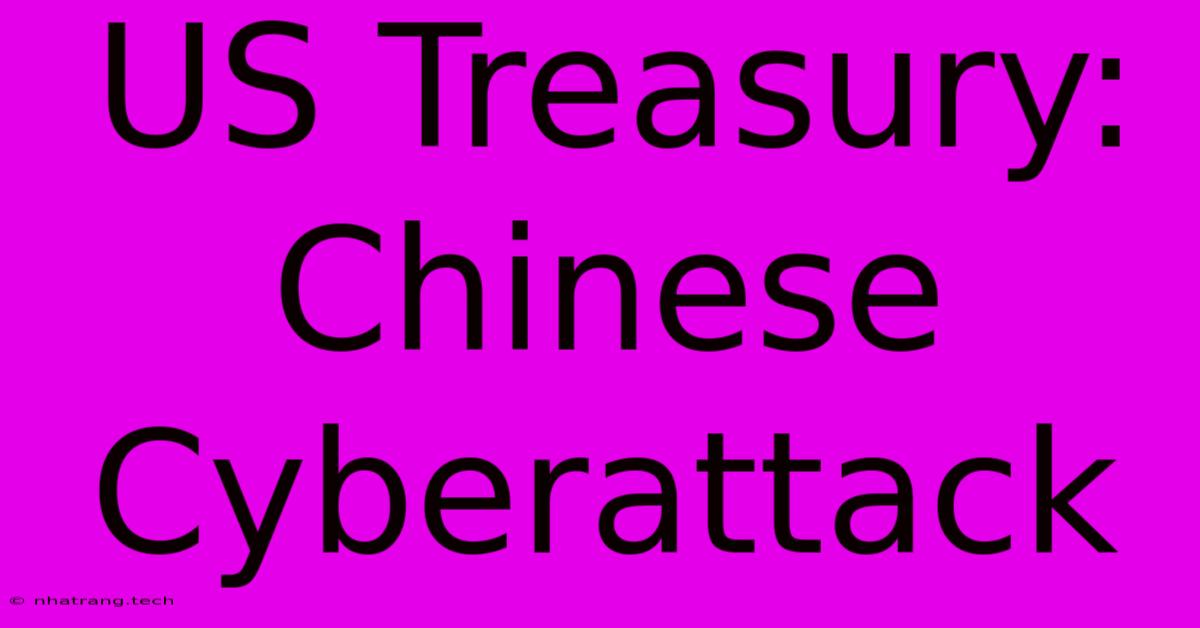US Treasury: Chinese Cyberattack

Discover more detailed and exciting information on our website. Click the link below to start your adventure: Visit Best Website mr.cleine.com. Don't miss out!
Table of Contents
US Treasury: Chinese Cyberattack – A Deep Dive into the Allegations and Implications
The alleged Chinese cyberattacks targeting the US Treasury and other government agencies have sparked significant concern and debate. This article delves into the details of these accusations, examining the evidence, the implications for US-China relations, and the ongoing cybersecurity challenges they represent.
Understanding the Allegations: A Timeline of Events
Reports surfaced in late 2020 alleging a sophisticated cyberattack originating from China, compromising several US government agencies, including the Department of the Treasury, the Commerce Department, and the Department of State. The attack, reportedly leveraging the widely exploited SolarWinds Orion software, allowed attackers to gain persistent access to internal networks for months, potentially exfiltrating sensitive data.
The timeline remains somewhat unclear, with investigations ongoing, but the suspected breach spanned a significant period, highlighting the difficulty of detecting and responding to such advanced persistent threats (APTs). The scale and sophistication of the operation suggest a highly organized and well-resourced attacker, consistent with state-sponsored activity.
Key Aspects of the Alleged Attack:
- SolarWinds Exploit: The attack leveraged a compromised update to SolarWinds Orion, a widely used network management platform. This allowed attackers to gain access to a vast network of clients.
- Data Exfiltration: The extent of data exfiltration remains under investigation, but reports suggest access to sensitive government information, potentially impacting national security and economic policy.
- Attribution Challenges: While the US government has attributed the attack to China, definitive proof remains elusive, and China denies any involvement. Attribution in cyberattacks is inherently difficult, requiring meticulous forensic analysis and intelligence gathering.
Implications for US-China Relations: Escalating Tensions?
The alleged attack significantly strained already tense US-China relations. The incident underscores the growing concern over state-sponsored cyberattacks and the potential for these attacks to disrupt critical infrastructure and undermine national security. The accusations have fueled calls for stronger cybersecurity measures and a more assertive response towards China's alleged cyber activities.
This incident is not an isolated event. The history of alleged cyber espionage between the US and China is extensive, contributing to a climate of mistrust and suspicion. The lack of a universally accepted framework for addressing state-sponsored cyberattacks further complicates the situation.
Potential Consequences:
- Economic Sanctions: The US could impose further economic sanctions on Chinese entities implicated in the attack.
- Diplomatic Fallout: The incident could lead to further deterioration in diplomatic relations and increased tensions.
- Cybersecurity Measures: The attack has spurred renewed efforts to strengthen US cybersecurity defenses and improve detection capabilities.
The Broader Cybersecurity Landscape: Lessons Learned
The alleged Chinese cyberattack on the US Treasury highlights the vulnerability of even the most sophisticated government networks to advanced persistent threats. It emphasizes the need for:
- Enhanced Software Security: Improved software development practices and rigorous security testing are crucial to prevent future exploits like the SolarWinds breach.
- Improved Threat Detection: Investing in advanced threat detection systems is essential for early identification of malicious activity.
- International Cooperation: International collaboration is vital to establish norms and frameworks for responsible state behavior in cyberspace.
- Zero Trust Architecture: Moving away from implicit trust and adopting a zero-trust security model can significantly mitigate the impact of successful breaches.
The alleged Chinese cyberattack serves as a stark reminder of the growing importance of cybersecurity in the 21st century. Strengthening defenses, improving international cooperation, and adopting a proactive approach are critical to mitigating the risks posed by state-sponsored cyberattacks and ensuring the security of vital government systems and sensitive information. Further investigation and transparency are essential to fully understanding the scope and implications of this incident and to preventing similar attacks in the future.

Thank you for visiting our website wich cover about US Treasury: Chinese Cyberattack. We hope the information provided has been useful to you. Feel free to contact us if you have any questions or need further assistance. See you next time and dont miss to bookmark.
Featured Posts
-
Massiver Rohrbruch Berlin Ohne Wasser
Jan 01, 2025
-
Regina Businesses Open Closed New Years Day
Jan 01, 2025
-
Cfp Biggest Names Preview The Season
Jan 01, 2025
-
Bernhard Brink Ueberraschender Wandel
Jan 01, 2025
-
Usps New Years Eve And Day 2025 Hours
Jan 01, 2025
